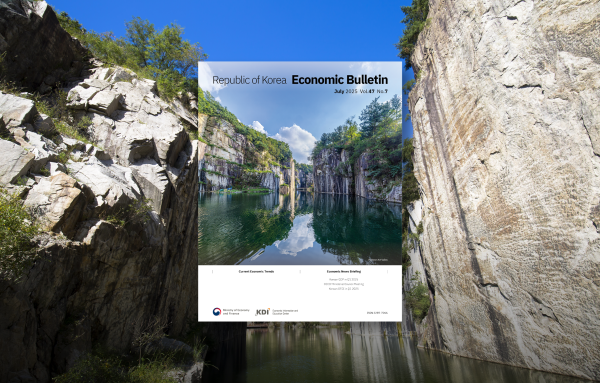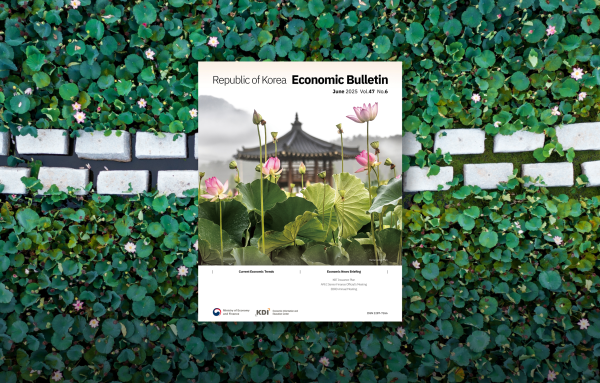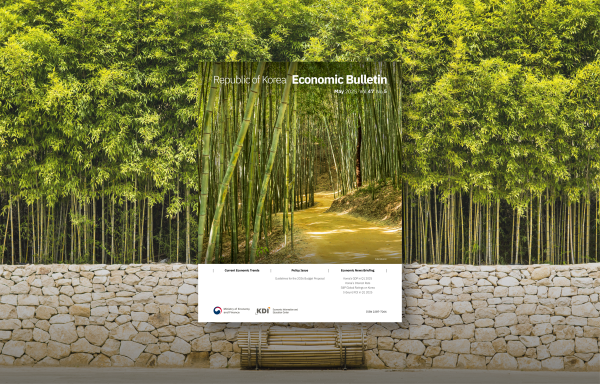
Republic of Korea Economic Bulletin, September 2021
- Date 2021-09-09 06:37
- CategoryNews
- Hit1928
The Economic Information and Education Center (EIEC) of KDI published the monthly periodical “Republic of Korea Economic Bulletin, September 2021” in English to provide information on Korea’s current economic trends, policy issue and various economic news to foreign countries.
The September publication provides the updated information related to the overall Korea’s economy including 2022 budget proposal. Main content is as follows:
[Economic Bulletin, September 2021]
[Current Economic Trends]
01. Economic activity
02. Financial markets
03. Public finance
[Policy Issue]
01. 2022 budget proposal
[Economic News Briefing]
01. External debt amounts to US $604.2 billion
02. Korea to promote subscription economy
03. Government announces measures for rare metals industry
Overview
Manufacturing, services and retail sales rose in June, as well as construction investment. Facility investment slowed. Jobs continued an upward trajectory in July and consumer price inflation speeded up.
Industrial production rose 1.6 percent from the previous month in June as mining and manufacturing (up 2.2%, m-o-m and up 11.9%, y-o-y) improved, as well as services (up 1.6%, m-o-m and up 4.9%, y-o-y). Compared with a year ago, industrial production rose 6.7 percent.
Retail sales (up 1.4%, m-o-m and up 1.6%, y-o-y) and construction investment (up 2.0%, m-o-m and down 3.1%, y-o-y) rose in June, and facility investment slowed somewhat (down 0.2%, m-o-m and up 10.0%, y-o-y).
Exports went up 29.6 percent year-on-year in July backed by strong semiconductors, petrochemicals and other major products. Average daily exports, an indicator calculated according to the days worked, rose 32.2 percent from a year ago (US $1.71 billion, July 2020 >> US $2.26 billion, July 2021).
The consumer sentiment index (CSI) fell 7.1 points in July to 103.2. The business sentiment index (BSI) for the manufacturing sector declined 1 point to 97, and the BSI outlook for August dropped 7 points to 92.
The cyclical indicator of the coincident composite index for June rose 0.1 points to 101.4, and the cyclical indicator of the leading composite index increased 0.3 points to 104.4.
The economy added 542,000 jobs year-on-year in July and the unemployment rate fell 0.8 percentage points from a year ago to 3.2 percent.
Consumer prices rose 2.6 percent year-on-year in July due to high prices of fresh food and oil products. Core inflation rose 1.7 percent.
Both stock prices and Korea Treasury yields fell in July as risk appetite waned amid virus resurgence. The won weakened.
Housing prices continued to rise in July (up 0.79% >> up 0.85%, m-o-m), as well as Jeonse (lump-sum deposits with no monthly payments) prices (up 0.45% >> up 0.59%, m-o-m).
Although the economy had showed solid recovery, exports picking up and employment improving, it now has to deal with uncertainties arising from the recent virus resurgence which has swung domestic consumption, particularly in the close-contact service sector.
Major economies have been recovering, but there are uncertainties over the spread of the delta variant, as well as over the impact of inflation.
The government will strengthen risk management, including keeping the disease under control, to help the economy maintain recovery momentum, as well as will work for prices to stay stable and to properly support low-income households.
Please click on the Economic Bulletin banner below to see and download the latest full PDF including previous editions.
Printed publications are available at the Information Desk in KDIS Library (3F) and the Display Table in KDI Central Library (5F).
If you have any inquiries, please feel free to contact us.
(KDI Economic Bulletin, +82-44-550-4621, hs.hwang@kdi.re.kr)
Related News
-

Research and Education10 days ago
Republic of Korea Economic Bulletin, July 2025#KDI #Economic #KDISCHOOL #kdischool #Economic Bulletin #Research
-

Research and Education38 days ago
Republic of Korea Economic Bulletin, June 2025#KDI #Economic #KDISCHOOL #kdischool #Economic Bulletin #Research
-

Research and Education72 days ago
Republic of Korea Economic Bulletin, May 2025#KDI #Economic #KDISCHOOL #kdischool #Economic Bulletin #Research



